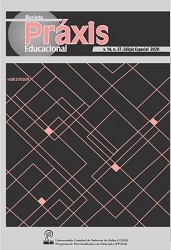THE EFFECTS OF CONVERGENT AND DIVERGENT TASKS ON IRANIAN EFL SPEAKING PERFORMANCE
DOI:
https://doi.org/10.22481/praxisedu.v16i37.6170Palavras-chave:
Tarefa convergente, Tarefa divergente, Desempenho de fala, Alunos de EFLResumo
O presente estudo teve como objetivo investigar os efeitos de tarefas convergentes e divergentes no desempenho da fala dos alunos de EFL no Irã. A população inicial deste estudo foi de 100 alunos de EFL. Eles foram selecionados no Mahan language Institute localizado em Karaj, Irã. Todos os participantes eram do sexo feminino. A língua nativa deles era o persa. Após a administração do Teste Preliminar de Inglês (PET), 60 alunos que tiveram seu nível de proficiência intermediário com base nos escores do PET foram selecionados para o estudo. Em seguida, eles foram divididos aleatoriamente em dois grupos experimentais, a saber, grupo de tarefas convergente e grupo de tarefas divergente. Os resultados do estudo revelaram que ambas as abordagens têm diferentes níveis de impacto no desempenho da fala e tarefas convergentes e divergentes afetam diferentemente o desempenho da fala dos alunos intermediários iranianos de EFL. Os resultados demonstraram que a amostra que recebeu tratamento baseado em tarefas divergentes mostrou um desenvolvimento significativo em termos de desempenho na fala (do pré-teste M = 68 ao pós-teste M = 83).
Downloads
Referências
Brown, H. D. (1994). Principles of Language Learning and Teaching. San Francisco: Prentice Hall Regents.
Burkart, G. & Sheppard, K. (2004). Content ESL across the USA: A Training Packet. A Descriptive Study of Content-ESL Practices. National Clearinghouse for English Language Acquisition.
Burns, A. & Joyce, H. (1997). Focus on Speaking. Sydney: National Center for English Language Teaching and Research.
Bygate, M. (1987). Speaking. Oxford: Oxford University Press.
Bygate, M. (1998). “Theoretical Perspectives on Speaking”. Annual Review of Applied Linguistics.18 (1), 20-42.
Bygate, M. (2002). Effects of task repetition on the structure and control of oral language. In M. Bygate et al.., (Eds.), Researching pedagogic tasks: Second language learning, teaching, and testing (pp. 23-48). Harlow: Longman.
Celce-Murcia, M. (2001). "Language Teaching Approaches: an Overview". In M. Celce- Murcia (Ed.), Teaching English as a Second or Foreign Language (3rd Ed.). Boston: Heinle & Heinle.
Cornbleet, S. and Carter, R. (2001). The Language of Speech and Writing. London: Routledge.
Cunningham, F. M. (1999). English language learners’ speaking skill. Eric Digest. Retrieved January, 15, 2009, from, ttp//:www.Eric.ed .gov
Duff, P. A. (1986). Another look at interlanguage talk: Taking task to task. In R. R. Day (Ed.), Talking to learn: Conversation in second language acquisition, (pp. 147-181). Rowley, MA: Newbery House.
Ellis, R. (2003). Task-based language learning and teaching. Oxford: Oxford University Press.
Florez, M. A. (1999). "Improving Adult English Language Learners’ Speaking Skills". ERIC Digest. (ERIC Document Reproduction Service No. ED: 435204
Graham-Marr, A. (2004). Teaching skills for listening and speaking. Retrieved, April, 9, 2009, from, http://www Abax . Co. jp/downloads/ extension/ETJ 2004.
Hilferty, A. (2005). "The Relationship between Reading and Speaking Skills". Focus on Basics. http://www.ncsall.net/?id=328, accessed on 22nd May, 2006.
Kolb, D.A. (1984). Experiential learning: Experiential learning and development. Newjersy: Practice-Hall,Inc.
Latchem, C., Latchem, C. R., & Jung, I. (2010). Distance and blended learning in Asia. New York: Taylor & Francis.
Levlet, W. J. M. (1989). Speaking: from Intention to Articulation. Cambridge, Mass: MIT Press.
Long, M. (1989). Focus on form: A design feature in language teaching methodology. In K. de Bot, R. Ginsberg & C. Kramsch (Eds.), Foreign language research in cross-cultural perspective (pp. 39-52). Amsterdam: John Benjamins.
Luoma, S. 2004. Assessing Speaking. Cambridge: Cambridge University Press.
Makumar, R. (2010). The impact of different task variance on writing proficiency. Retrieved on October 6, 2011, from: www.scripties.let.eldoc.ub.rug.nl/root/Master/ DoorstroomMasters/ToegepasteTaalwetens/2010/Makmur.
Marashi, H., & Hatam, G. (2009). Using tasks in a content-based program: Does it enhance vocabulary learning? Iranian Journal of Teaching English as a Foreign Language and Literature, 1(4), 73-91.
Marashi, H., & Shizari, T. Parisa. (2015). Using Convergent and Divergent Tasks to Improve Writing and Language Learning Motivation. Iranian Journal of Language Teaching Research, 3 (1), 99-117.
Nezhad. R., & Shokrpour, G. N. (2013). The Impact of Task Type and Divergent Thinking on Reading Proficiency. International Journal of English Language and Literature Studies. 2 (2), 124-137.
Nielsen, H., Bayard, M., Pickett, C., & Simonton, D. (2008). Conceptual versus experimental creativity: Which works best on convergent and divergent thinking tasks? Psychology of Aesthetics, Creativity, and the Arts, 2(3), 131-138.
Nunan, D. (1989). Designing Tasks for the Communicative Classroom. New York: Cambridge University Press.
Nunan, D. (1999). Second Language Teaching and Learning. Boston: Heinle & Heinle Publishers.
Nunan, D. (2004). An Introduction to Task Based Teaching. Cambridge: Cambridge University Press.
Nunan, D. (2006). Task-based language teaching in the Asia context: Defining ‘task’. Asian EFL Journal, 8(3), 12-18.
Pica, T. (1997). Second language teaching and research relationships: A North American view. Language Teaching Research, 1, 48-72.
Plews, J. L., & Zhao, K. (2010). Tinkering with tasks knows no bounds: ESL teachers’ adaptations of task-based language-teaching. TESL Canada Journal, 28(1), 41-59.
Pourdana, N., Karimi Behbahani, M., & Safdari, M. (2011). The impact of task types on aspects of Iranian EFL learners' writing performance: Accuracy, fluency, and complexity. IPEDR, 20, 261-265.
Prabhu, N.S. (1987). Second Language Pedagogy. Oxford: Oxford University.
Regina, S. (1997). English Language Arts: A Curriculum Guide for the Middle Level (Grades 6-9). Canada: Saskatchewan Education.
Skehan, P. (2001). “A Non-marginal Role for Tasks”. ELT Journal, 56(3), 289-295.
Swain, M. (1985). Communicative competence: some roles of comprehensible input and comprehensible output and its development. In S. Gass, C. Maden (Eds.). Input in Second Language Acquisition. Roleway, Mass: Newbury House.
Swain, M. (1985). Communicative competence: some roles of comprehensible input and comprehensible output and its development. In S. Gass, C. Maden (Eds.). Input in Second Language Acquisition. Roleway, Mass: Newbury House.
Swan, M. (2005). Legislation by hypothesis: The case of task-based in-struction. Applied Linguistics, 26(3), 376-401.
Trachsel, M. &Severino, C. (2004). The Challenges of Integrating and Balancing Speaking and Writing in First-Year Rhetoric Classes.
Ur, P. (2006). A Course in Language Teaching: Practice and theory (13th Ed.). Cambridge: Cambridge University Press.
Willis, J. (1996). A Framework for Task-Based Learning. Harlow: Longman.
Wilson, J. A. (1997). A program to develop the listening and speaking skills of children in a first grade classroom. In C. Smith, (Ed). Skills students use when speaking and listening. Retrieved November, 15,2008, from http://eric.indiana.edu
Downloads
Publicado
Como Citar
Edição
Seção
Licença
Você é livre para:
Compartilhar - copia e redistribui o material em qualquer meio ou formato; Adapte - remixe, transforme e construa a partir do material para qualquer propósito, mesmo comercialmente. Esta licença é aceitável para Obras Culturais Livres. O licenciante não pode revogar essas liberdades, desde que você siga os termos da licença.
Sob os seguintes termos:
Atribuição - você deve dar o crédito apropriado, fornecer um link para a licença e indicar se alguma alteração foi feita. Você pode fazer isso de qualquer maneira razoável, mas não de uma forma que sugira que você ou seu uso seja aprovado pelo licenciante.
Não há restrições adicionais - Você não pode aplicar termos legais ou medidas tecnológicas que restrinjam legalmente outros para fazer qualquer uso permitido pela licença.












